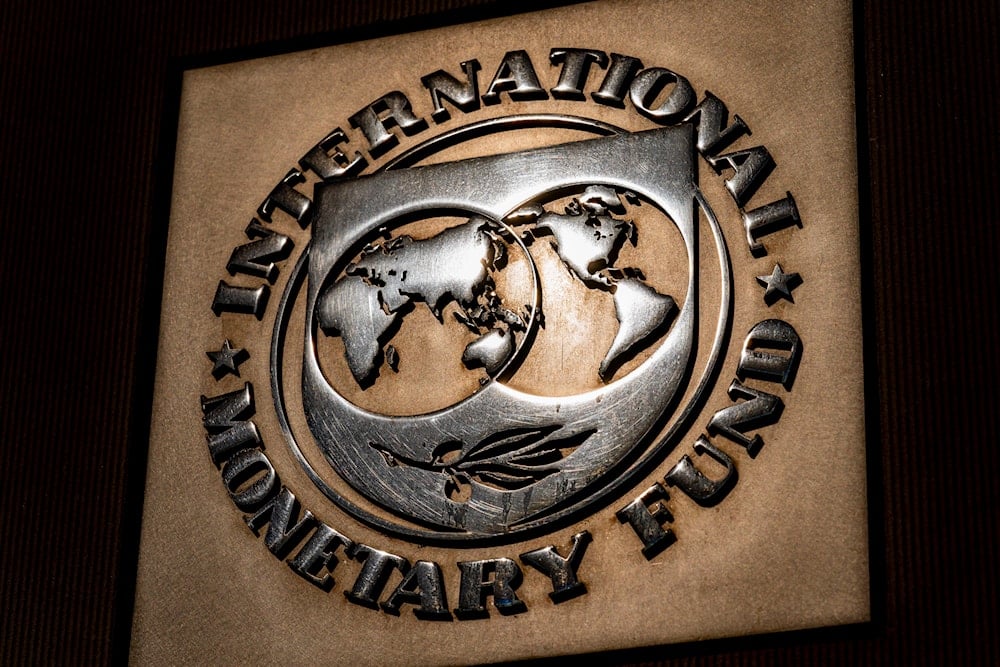IMF cuts 'Israel's' 2024 growth forecast by over half
The IMF also increases "Israel's" inflation forecast for 2024 to 3.1%, up from 2.4%, surpassing the Israeli government's target range of 1-3%.
-

The logo of the International Monetary Fund is visible on its building, in Washington on April 5, 2021. (AP)
The International Monetary Fund (IMF) on Tuesday cut "Israel's" growth forecast for 2024 from 1.6% in April to 0.7%. This new estimate, included in the IMF's latest World Economic Outlook report, is also much lower than the 3% projection made in early October last year.
"Israel's" 2025 growth forecast was cut to 2.7% from 5.4%, according to the report.
The IMF also increased "Israel's" inflation forecast for 2024 to 3.1%, up from 2.4%, surpassing the Israeli government's target range of 1-3%. Additionally, the 2025 inflation forecast was raised to 3% from 2.5%.
The report cautioned that projections for "Israel" are fraught with uncertainty, largely stemming from the unpredictable ramifications of the ongoing regional escalations.
A report last week revealed that "Israel" lowered second-quarter growth as the ongoing war on Gaza and Lebanon continues to weigh heavily on the occupation's economy than originally estimated.
Gross domestic product increased by an annualized 0.3% in seasonally adjusted terms in the three months through June, according to the Central Bureau of Statistics' third and final review, published on October 15. The previous two estimates released in August and last month indicated growth rates of 1.2% and 0.7% respectively.
Compared to 8.2% in the earlier forecast, the amount was reduced mostly owing to a shift in government consumption, which is now up 5.3% for the second quarter.
The Finance Ministry and Central Bank recently reduced "Israel's" estimated annual GDP growth rate for 2024 to 1.1% and 0.5%, respectively. S&P Global Ratings predicts a 0% growth rate, according to a recent announcement, and has downgraded "Israel's" credit rating to A by one notch.
Exports, excluding diamonds and startup enterprises, fell for the third quarter in a row, contributing significantly to the downturn. Fixed-asset investments have stalled and are now forecast to be somewhat lower than originally projected.
The construction downturn has contributed significantly to the decline in fixed investments. The sector depends on Palestinian laborers from the West Bank, who have been prevented from entering occupied territories since the war began.
War is costing Israeli economy over $66.6 billion: Smotrich
Earlier this month, Israeli Finance Minister Bezalel Smotrich acknowledged that the ongoing "war is the longest and most expensive war in Israel’s history", with direct costs amounting to approximately 250 billion shekels ($66.6 billion) so far.
He further emphasized that this figure is likely to increase, stating, "We will all feel the need to finance this war, and it will not be easy for us."
Meanwhile, Gad Lior, a journalist for Ynet News, offered a sharp critique of Smotrich's presentation of the economic situation during an interview with Ynet Studio on October 9. He argued that Smotrich's analysis lacked a solid grasp of economic principles and failed to acknowledge the prevailing realities affecting the Israeli economy.
Lior highlighted Smotrich's characterization of Moody's report as "weak and absurd," stating that "economists in London will not lecture us." He warned that such remarks could encourage credit rating agencies to continue downgrading "Israel's" rating and pointed out that Smotrich's information about the headquarters of Moody's and its management was incorrect.
In this context, he noted that there is a consensus among economists, both in "Israel" and globally, that the Israeli economy has not been managed responsibly over the past year.

 4 Min Read
4 Min Read








